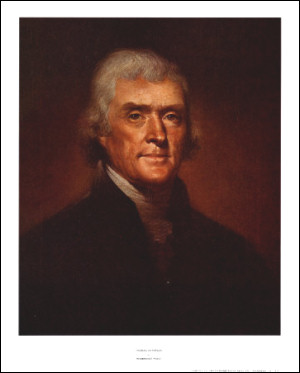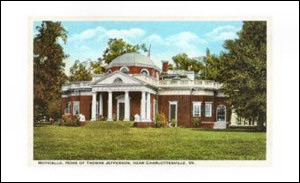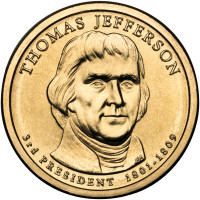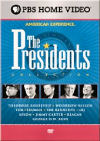HOME
INTRO
SYMBOLS
ALMANAC
ECONOMY
GEOGRAPHY
STATE MAPS
PEOPLE
FORUM
NEWS
COOL SCHOOLS
STATE QUIZ
BOOK STORE
MARKETPLACE
STATE LINKS
GUESTBOOK
CONTACT US
| Report broken link | |
| All the presidents |


Thomas Jefferson (1743-1826)
In Article II, Section 1 of the Constitution of the United States of America, the following requirements are stipulated for those wishing to hold the office of the President of the United States.
No person except a natural born Citizen, or a Citizen of the United States, at the time of the Adoption of this Constitution, shall be eligible to the Office of President; neither shall any Person be eligible to that Office who shall not have attained to the Age of thirty-five Years, and been fourteen Years a Resident within the United States.
3rd President of the United States (1801-1809)
In the thick of party conflict in 1800, Thomas Jefferson wrote in a private letter, "I have sworn upon the altar of God eternal hostility against every form of tyranny over the mind of man."
| Thomas Jefferson: | |
|---|---|
| Source: University of Virginia, Miller Center of Public Affairs, www.millercenter.virginia.edu, August 3, 2007. | |
| 3rd President of the United States | |
| Born: | April 13, 1743, Shadwell plantation, northern portion of Goochland County (now Albemarle County), Virginia. |
| Nickname: | "Man of the People," "Sage of Monticello" |
| Education: | College of William and Mary (graduated 1762) |
| Religion: | No formal affiliation |
| Marriage: | January 1, 1772, to Martha Wayles Skelton (1748-1782) |
| Children: | Martha (1772-1836), Jane Randolph (1774-1775), infant son (1777), Mary (1778-1804), Lucy Elizabeth (1780-1781), Lucy Elizabeth (1782-1785) |
| Career: | Lawyer, Planter |
| Political Party: | Democratic-Republican |
| President: | Two terms (eight years) from 1801-1809. |
| Age at inauguration: | 57 |
| Died: | July 4, 1826, Monticello, near Charlottesville, Virginia. |
| Interred: | Monticello, near Charlottesville, Virginia. |
This powerful advocate of liberty was born in 1743 in Albemarle County, Virginia, inheriting from his father, a planter and surveyor, some 5,000 acres of land, and from his mother, a Randolph, high social standing. He studied at the College of William and Mary and then read law. In 1772 he married Martha Wayles Skelton, a widow, and took her to live in his partly constructed mountaintop home, Monticello.
Freckled and sandy-haired, rather tall and awkward, Jefferson was eloquent as a correspondent, but he was no public speaker. In the Virginia House of Burgesses and the Continental Congress, he contributed his pen rather than his voice to the patriot cause. As the "silent member" of the Congress, Jefferson, at 33, drafted the Declaration of Independence. In years following he labored to make its words a reality in Virginia. Most notably, he wrote a bill establishing religious freedom, enacted in 1786.
 |
| Thomas Jefferson by Rembrandt Peale
White House Collection Jefferson Prints |
Jefferson succeeded Benjamin Franklin as minister to France in 1785. His sympathy for the French Revolution led him into conflict with Alexander Hamilton when Jefferson was Secretary of State in President Washington's Cabinet. He resigned in 1793.
Sharp political conflict developed, and two separate parties, the Federalists and the Democratic-Republicans, began to form. Jefferson gradually assumed leadership of the Republicans, who sympathized with the revolutionary cause in France. Attacking Federalist policies, he opposed a strong centralized Government and championed the rights of states.
As a reluctant candidate for President in 1796, Jefferson came within three votes of election. Through a flaw in the Constitution, he became Vice President, although an opponent of President Adams. In 1800 the defect caused a more serious problem. Republican electors, attempting to name both a President and a Vice President from their own party, cast a tie vote between Jefferson and Aaron Burr. The House of Representatives settled the tie. Hamilton, disliking both Jefferson and Burr, nevertheless urged Jefferson's election.
When Jefferson assumed the Presidency, the crisis in France had passed. He slashed Army and Navy expenditures, cut the budget, eliminated the tax on whiskey so unpopular in the West, yet reduced the national debt by a third. He also sent a naval squadron to fight the Barbary pirates, who were harassing American commerce in the Mediterranean. Further, although the Constitution made no provision for the acquisition of new land, Jefferson suppressed his qualms over constitutionality when he had the opportunity to acquire the Louisiana Territory from Napoleon in 1803.
He did not infringe upon the policy making powers that he felt the Constitution gave Congress. But the determination of foreign policy became preponderantly a Presidential concern. When the French Revolution led to a major war between France and England, Washington refused to accept entirely the recommendations of either his Secretary of State Thomas Jefferson, who was pro-French, or his Secretary of the Treasury Alexander Hamilton, who was pro-British. Rather, he insisted upon a neutral course until the United States could grow stronger.
 |
| Monticello, Thomas Jefferson's Home
Monticello Prints |
During Jefferson's second term, he was increasingly preoccupied with keeping the Nation from involvement in the Napoleonic wars, though both England and France interfered with the neutral rights of American merchantmen. Jefferson's attempted solution, an embargo upon American shipping, worked badly and was unpopular.
Jefferson retired to Monticello to ponder such projects as his grand designs for the University of Virginia. A French nobleman observed that he had placed his house and his mind "on an elevated situation, from which he might contemplate the universe."
He died on July 4, 1826.
Source: www.WhiteHouse.gov, August 5, 2007.
Presidential $1.00 coin:
 |
| U.S. Mint Image |
Sometimes referred to as the "silent member" of the Continental Congress, Thomas Jefferson spoke volumes with his pen. He drafted the Declaration of Independence at the age of 33, and later succeeded Benjamin Franklin as America's foreign minister to France.
During his first term as President, Thomas Jefferson virtually doubled the size of the United States when his Administration successfully completed the Louisiana Purchase in 1803 and commissioned the Lewis & Clark Expedition to explore the new territory. The United States Mint's recent Westward Journey Nickel Series™ marked the bicentennial of these important events.
At the end of his Presidency, Jefferson retired to Monticello, where he worked to establish the University of Virginia in nearby Charlottesville. In March 1825, the school opened to serve its first 123 students.
Coinage Legislation under President Thomas Jefferson
Act of March 3, 1803: This Act continues, in force, the Act of March 3, 1801, directing the location of the United States Mint to remain in Philadelphia for another five years.
Act of April 10, 1806: This Act authorizes certain gold and silver coinage from Great Britain, France, Portugal, and Spain and its dominions as legal tender for the payment of all debts within the United States. Values are assigned to these certain coins and the Secretary of the Treasury is charged with the responsibility to "cause assays of the foreign gold and silver coins made current by this act" at least once a year.
Act of April 21, 1806: This Act establishes penalties for counterfeiting both foreign and domestic coins to be between three and ten years hard labor.
Act of April 1, 1808: This Act continues to fix the location of the United States Mint in Philadelphia for five more years.
United States Mint Directors appointed by President Jefferson
- 1806: Robert Patterson, Fourth Director of the United States Mint.
Source: www.USMint.gov, August 5, 2007.
Additional resources:
 Monticello Thomas Jefferson Wiki
Trustworthy information on Thomas Jefferson and his world by Monticello researchers and respected Jefferson scholars.
Monticello Thomas Jefferson Wiki
Trustworthy information on Thomas Jefferson and his world by Monticello researchers and respected Jefferson scholars.
Thomas Jefferson (Library of Congress Exhibition) This exhibition focuses on the extraordinary legacy of Thomas Jefferson--founding father, farmer, architect, inventor, slaveholder, book collector, scholar, diplomat, and the third president of the United States.
Thomas Jefferson America's Story from America's Library, the Library of Congress.
American Presidents: Life Portraits A Site to Complement C-SPAN's 20th Anniversary Television Series, American Presidents: Life Portraits.
Thomas Jefferson (1801-1809) American President: An Online Reference Resource from the Miller Center of Public Affairs, University of Virginia. In-depth information reviewed by prominent scholars on each President and administration.
Thomas Jefferson This PBS site explores the storied and controversial life of Thomas Jefferson through photo essays, background information, and classroom activities. Companion site for Ken Burn's film, Thomas Jefferson.
Thomas Jefferson Companion site for Public Broadcasting's American Experience: The Presidents.
Thomas Jefferson Thomas Jefferson from Wikipedia, the free encyclopedia.
Thomas Jefferson: Third President The American Presidency: A Glorious Burden: Objects from the Presidency from the Smithsonian National Museum of American History, Behring Center.
The Thomas Jefferson Papers 1606-1827 The complete Thomas Jefferson Papers from the Manuscript Division at the Library of Congress consists of approximately 27,000 documents.
Thomas Jefferson Digital Archive Electronic Text Center from the University of Virginia Library.
Thomas Jefferson's Monticello Monticello is the autobiographical masterpiece of Thomas Jefferson, designed and redesigned and built and rebuilt for more than forty years. Explore the house, gardens, and plantation of Monticello, the mountaintop home of Thomas Jefferson, third president of the United States and author of the Declaration of Independence.

The Presidents
Collection DVD
Jefferson and His Time, by Dumas Malone, 6 volumes, University of Virginia Press (June 30, 2005). Dumas Malone's classic biography Jefferson and His Time - originally published in six volumes over a period of thirty-four years, between 1948 and 1982 - was awarded the Pulitzer Prize in history and became the standard work on Jefferson's life. The University of Virginia Press is pleased to announce that the complete, illustrated six-volume biography is available for the first time in a handsome boxed set. Merrill Peterson, editor of the Library of America edition of Thomas Jefferson's writings, has contributed a new foreword to the Virginia edition.
Thomas Jefferson and the New Nation, by Merrill Peterson, 1,104 pages, Oxford University Press, USA; New Ed edition (September 11, 1986) The definitive life of Jefferson in one volume, this biography relates Jefferson's private life and thought to his prominent public position and reveals the rich complexity of his development. As Peterson explores the dominant themes guiding Jefferson's career -- democracy, nationality, and enlightenment -- and Jefferson's powerful role in shaping America, he simultaneously tells the story of nation coming into being.
The Pursuit of Reason: The Life of Thomas Jefferson, by Noble E. Cunningham, 414 pages, Ballantine Books (May 12, 1988) The authoritative single-volume biography of Thomas Jefferson, perhaps the most significant figure in American history. He was a complex and compelling man: a fervent advocate of democracy who enjoyed the life of a southern aristocrat and owned slaves, a revolutionary who became president, a believer in states' rights who did much to further the power of the federal government. Drawing on the recent explosion of Jeffersonian scholarship and fresh readings of original sources, In Pursuit of Reason is a monument to Jefferson that will endure for generations.
American Sphinx: The Character of Thomas Jefferson, by Joseph J. Ellis, 464 pages, Vintage (April 7, 1998) For a man who insisted that life on the public stage was not what he had in mind, Thomas Jefferson certainly spent a great deal of time in the spotlight--and not only during his active political career. After 1809, his longed-for retirement was compromised by a steady stream of guests and tourists who made of his estate at Monticello a virtual hotel, as well as by more than one thousand letters per year, most from strangers, which he insisted on answering personally.
Thomas Jefferson, by R. B. Bernstein, 288 pages, Oxford University Press, USA (July 27, 2005) In Thomas Jefferson, Bernstein offers the definitive short biography of this revered American -- the first concise life in six decades. Bernstein deftly synthesizes the massive scholarship on his subject into a swift, insightful, evenhanded account.
More Thomas Jefferson books
from Amazon.com.
Thomas Jefferson
on DVD from Amazon.com.
Site designed exclusively for NETSTATE.COM by NSTATE, LLC

NETSTATE.COM is a Trademark of NSTATE, LLC.
Copyright © by NSTATE, LLC. All rights reserved.
No copyright is claimed on non-original or licensed material.
Support NETSTATE


